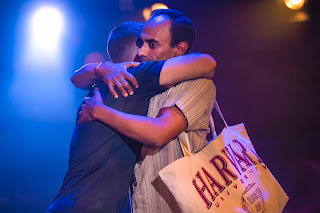The P Word | Bush Theatre
© Craig Fuller
I found myself rethinking a lot about what I learned from that process the other night when watching The P Word at Bush Theatre. The show recounts the story of two gay Pakistani men; Bilal (Waleed Akhtar) leads a busy but lonely life between his job in fashion, the gym, and Grindr hook-ups. Zafar (Esh Alladi) is an asylum seeker who fled from his village after his father murdered his partner; he now finds himself in the hostile Hounslow, waiting for his claim to be processed.
In order not to be sent back to his death, Zafar has to, somehow, prove his homosexuality. The bureaucratic performance he is expected to provide is dehumanizing and heavily relies on the enactment of a convincing interpretation of how a persecuted gay refugee should act, feel, and be like. For this reason, Zafar's lawyer thinks it wise for him to go to the Pride parade - a type of environment Zafar is ostensibly not comfortable in - and take pictures, to show that he is "integrating" and connecting with the community that he claims to belong to. Furthermore, recordings of officers at immigration control show Zafar's experience with extremely intrusive and identity-eroding questions; his sexual identity becomes the subject of controlling and humiliating requests for both concealment and revelation, adding a feeling of shame to the immense grief and isolation that he is already experiencing.
The situation is bleak. But it is at this point of the show, during Pride, that Bilal and Zafar meet. The two storylines merge into one, with both characters retaining their roles as narrators even when they're together, so we still get to participate in their thoughts. A wonderful friendship forms between the two men - a tender, platonic relationship in which they both evolve and learn about each other and themselves. Particularly moving are the characters' exchanges on their shared culture and heritage; also, the thoughtfulness with which they take care of each other in big and small ways.
As Bilal and Zafar evolve, so does their bond. Bollywood shows, introduced as a bonding activity between the two, start to infiltrate their own relationship. While I am far more invested in their friendship rather than their romance, Akhtar and Alladi treat their characters well under Anthony Simpson-Pike's careful direction, and conclude the love story with an emotional episode of solidarity, activism, and collective power.
Immediately after, we break away from the story. Happy endings are so tough to negotiate when they are the exception, and Akhtar's writing is right to point it out. The P Word recounts painful othering and makes us confront the mental, emotional, social and financial strain that comes with it; even Bilal, when asked if he and Zafar are together, replies: "No, he's not my type, he's an asylum seeker" - a point that reinforces the power of prejudices which perpetuate abjection. However, a great merit of the production is to show that prejudice can be overcome, and doing so with heart, compassion and courage.
© Greta Rilletti Zaltieri, 2022




Very nice
ReplyDeleteKudos to the actors, director, and the entire team for tackling such sensitive topics with empathy and courage. It's heartening to see how theatre can be a platform for social reflection and change, making London theatre tickets a gateway to not just entertainment but also to broaden one's perspectives on the complexities of the human experience.
ReplyDeleteThank you for your comments, Hasnain!
Delete